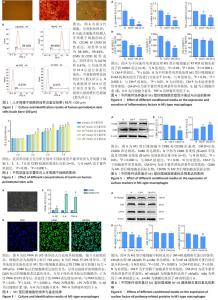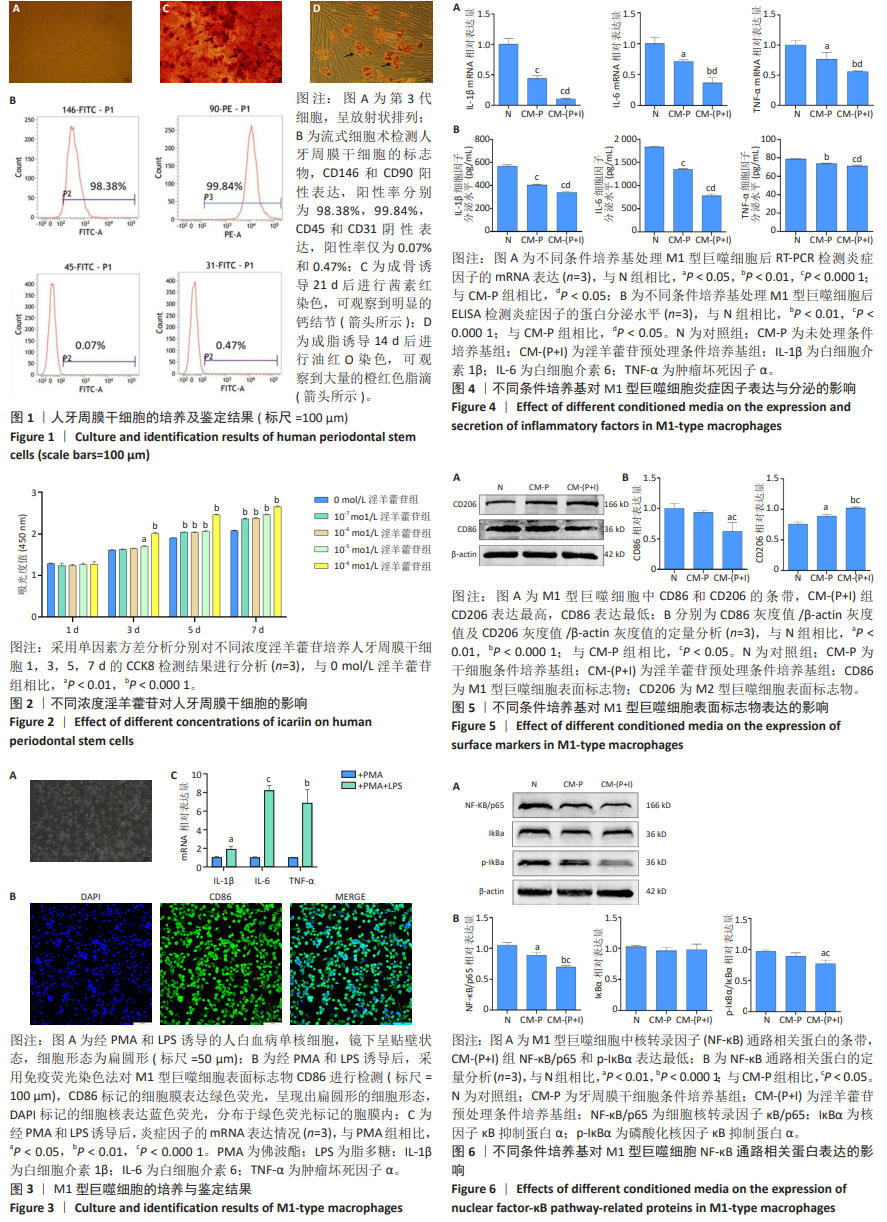[1] TONETTI MS, GREENWELL H, KORNMAN KS. Staging and grading of periodontitis: Framework and proposal of a new classification and case definition. J Periodontol. 2018;89 Suppl 1:S159-S172.
[2] ARABPOUR M, SAGHAZADEH A, REZAEI N. Anti-inflammatory and M2 macrophage polarization-promoting effect of mesenchymal stem cell-derived exosomes. Int Immunopharmacol. 2021;97:107823.
[3] ZHU LF, LI L, WANG XQ, et al. M1 macrophages regulate TLR4/AP1 via paracrine to promote alveolar bone destruction in periodontitis. Oral Dis. 2019;25(8):1972-1982.
[4] LIU L, GUO H, SONG A, et al. Progranulin inhibits LPS-induced macrophage M1 polarization via NF-κB and MAPK pathways. BMC Immunol. 2020;21(1):32.
[5] NEMETH K, LEELAHAVANICHKUL A, YUEN PS, et al. Bone marrow stromal cells attenuate sepsis via prostaglandin E(2)-dependent reprogramming of host macrophages to increase their interleukin-10 production. Nat Med. 2009;15(1):42-49.
[6] KODE JA, MUKHERJEE S, JOGLEKAR MV, et al. Mesenchymal stem cells: immunobiology and role in immunomodulation and tissue regeneration. Cytotherapy. 2009;11(4):377-391.
[7] SONG N, SCHOLTEMEIJER M, SHAH K. Mesenchymal stem cell immunomodulation: mechanisms and therapeutic potential. Trends Pharmacol Sci. 2020;41(9):653-664.
[8] LIU J, CHEN B, BAO J, et al. Macrophage polarization in periodontal ligament stem cells enhanced periodontal regeneration. Stem Cell Res Ther. 2019;10(1):320.
[9] ZU Y, MU Y, LI Q, et al. Icariin alleviates osteoarthritis by inhibiting NLRP3-mediated pyroptosis. J Orthop Surg Res. 2019;14(1):307.
[10] WU ZM, LUO J, SHI XD, et al. Icariin alleviates rheumatoid arthritis via regulating miR-223-3p/NLRP3 signalling axis. Autoimmunity. 2020;53(8):450-458.
[11] CAO Y. Icariin alleviates MSU-induced rat GA models through NF-κB/NALP3 pathway. Cell Biochem Funct. 2021;39(3):357-366.
[12] 李聪聪,赵鹏,秦燕勤,等.淫羊藿苷的药理活性研究进展[J].中医学报,2020,35(4):781-786.
[13] 秦子顺,殷丽华,王开娟,等.淫羊藿苷促进人牙周膜干细胞增殖及骨向分化的作用[J].华西口腔医学杂志,2015,33(4):370-376.
[14] LIU HJ, LIU XY, JING DB. Icariin induces the growth, migration and osteoblastic differentiation of human periodontal ligament fibroblasts by inhibiting Toll-like receptor 4 and NF-κB p65 phosphorylation. Mol Med Rep. 2018;18(3):3325-3331.
[15] 罗小玲,张丽,杨茂桦,等.柚皮素干预人牙周膜干细胞的成骨分化能力[J].中国组织工程研究,2022,26(7):1051-1056.
[16] WANG J, QIAO Q, SUN Y, et al. Osteogenic differentiation effect of human periodontal ligament stem-cell initial cell density on autologous cells and human bone marrow stromal cells. Int J Mol Sci. 2023;24(8):7133.
[17] ZHAO Z, SUN Y, QIAO Q, et al. Human periodontal ligament stem cell and umbilical vein endothelial cell co-culture to prevascularize scaffolds for angiogenic and osteogenic tissue engineering. Int J Mol Sci. 2021; 22(22):12363.
[18] GUGLIANDOLO A, DIOMEDE F, PIZZICANNELLA J, et al. Potential anti-inflammatory effects of a new lyophilized formulation of the conditioned medium derived from periodontal ligament stem cells. Biomedicines. 2022;10(3):683.
[19] CHEN MH, WANG YH, SUN BJ, et al. HIF-1alpha activator DMOG inhibits alveolar bone resorption in murine periodontitis by regulating macrophage polarization. Int Immunopharmacol. 2021;99:107901.
[20] ZHOU P, LI Q, SU S, et al. Interleukin 37 suppresses M1 macrophage polarization through inhibition of the notch1 and nuclear factor kappa B pathways. Front Cell Dev Biol. 2020;8:56.
[21] SARSENOVA M, ISSABEKOVA A, ABISHEVA S, et al. Mesenchymal stem cell-based therapy for rheumatoid arthritis. Int J Mol Sci. 2021; 22(21):11592.
[22] ZHAO J, LI X, HU J, et al. Mesenchymal stromal cell-derived exosomes attenuate myocardial ischaemia-reperfusion injury through miR-182-regulated macrophage polarization. Cardiovasc Res. 2019;115(7): 1205-1216.
[23] FERNANDES TL, GOMOLL AH, LATTERMANN C, et al. Macrophage: a potential target on cartilage regeneration. Front Immunol. 2020,11:111.
[24] LIU Y, ZHENG Y, DING G, et al. Periodontal ligament stem cell-mediated treatment for periodontitis in miniature swine. Stem Cells. 2008;26(4):1065-1073.
[25] TANG R, WEI F, WEI L, et al. Osteogenic differentiated periodontal ligament stem cells maintain their immunomodulatory capacity. J Tissue Eng Regen Med. 2014;8(3):226-232.
[26] LIU O, XU J, DING G, et al. Periodontal ligament stem cells regulate B lymphocyte function via programmed cell death protein 1. Stem Cells. 2013;31(7):1371-1382.
[27] LIU J, WANG H, ZHANG L, et al. Periodontal ligament stem cells promote polarization of M2 macrophages. J Leukoc Biol. 2022;111(6): 1185-1197.
[28] TEDESCO S, DE MAJO F, KIM J, et al. Convenience versus biological significance: are PMA-differentiated THP-1 cells a reliable substitute for blood-derived macrophages when studying in vitro polarization? Front Pharmacol. 2018;9:71.
[29] ZHANG X, HUANG F, LI W, et al. Human gingiva-derived mesenchymal stem cells modulate monocytes/macrophages and alleviate atherosclerosis. Front Immunol. 2018;9:878.
[30] ZHANG J, RONG Y, LUO C, et al. Bone marrow mesenchymal stem cell-derived exosomes prevent osteoarthritis by regulating synovial macrophage polarization. Aging (Albany NY). 2020;12(24):25138-25152.
[31] FAN JJ, CAO LG, WU T, et al. The dose-effect of icariin on the proliferation and osteogenic differentiation of human bone mesenchymal stem cells. Molecules. 2011;16(12):10123-10133.
[32] CHEN S, DENG X, MA K, et al. Icariin improves the viability and function of cryopreserved human nucleus pulposus-derived mesenchymal stem cells. Oxid Med Cell Longev. 2018;2018:3459612.
[33] TENG YY, ZOU ML, LIU SY, et al. Dual-action icariin-containing thermosensitive hydrogel for wound macrophage polarization and hair-follicle neogenesis. Front Bioeng Biotechnol. 2022;10:902894.
[34] BAI L, LIU Y, ZHANG X, et al. Osteoporosis remission via an anti-inflammaging effect by icariin activated autophagy. Biomaterials. 2023;297:122125.
[35] LAWRENCE T. The nuclear factor NF-kappaB pathway in inflammation. Cold Spring Harb Perspect Biol. 2009;1(6):a001651.
[36] SUN SC. The non-canonical NF-κB pathway in immunity and inflammation. Nat Rev Immunol. 2017;17(9):545-558.
[37] DORRINGTON MG, FRASER I. NF-κB signaling in macrophages: dynamics, crosstalk, and signal integration. Front Immunol. 2019; 10:705.
[38] NING H, CHEN H, DENG J, et al. Exosomes secreted by FNDC5-BMMSCs protect myocardial infarction by anti-inflammation and macrophage polarization via NF-κB signaling pathway and Nrf2/HO-1 axis. Stem Cell Res Ther. 2021;12(1):519. |

